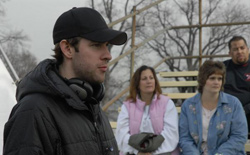About a month before Brief Interviews with Hideous Men started filming—and not long before the author David Foster Wallace committed suicide—director and ambitious adaptor John Krasinski (Jim in TV’s The Office) discussed the project with Wallace. Wallace’s book—an exploration of the male psyche via 23 interviews with men all discussing a personal grotesque or bizarre characteristic—had been deemed unfilmable. But Krasinski was determined to bring the material to the big screen (it was adapted for stage in 2000) and created a character to help tie together the inchoate narrative.
“I told him [Wallace] how I had changed the script to center around a woman who is either a psychology or anthropology grad student and that’s her connection to these men, she’s interviewing them for her thesis,” Krasinski explained in a recent interview. “He [Wallace] paused, and then he said that’s what he was trying to do in the book. He wanted to write about a character that you never hear from and never see, but by all the characters around her, you know who she is.”
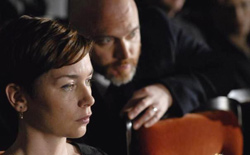
If he had lived to see the movie’s release, I have to think Wallace would have been impressed with the way that Krasinski’s Sara (Julianne Nicholson) manages to embody his aim by being both at the center of the film and also practically invisible. I would be shocked if her dialogue ran to more than five pages total, a pittance for the central character of a movie. Sara is the calm at the center of this tornado of testosterone, so calm she might actually be a vacuum.
Wallace wondered if Krasinski’s decision to give Sara a personal connection to one of her subjects was the answer to making sense of the whole thing. And I think it might have been. But this Sara is so slight, she provides none of the consolations of coherence that one might hope for while wading through esoteric monologues about what women really want. She certainly offers little attempt to answer that question—verbally or otherwise—and spends most of the movie listening impassively (with a few notable exceptions) to her subjects.
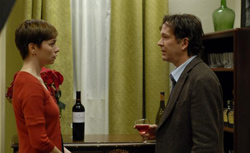
Speaking of those subjects, Krasinski has wrangled a notable lineup including Timothy Hutton, Will Arnett, Chris Messina, Frankie Faison, and Death Cab for Cutie frontman Ben Gibbard to fill the ranks of his hideous men. It’s interesting that Krasinski, famous for the high populist humor on The Office, went for what might be considered high art in his directorial debut. The movie is light on actual conversation; instead, most of the words come in monologues that create an effect not unlike a series of somewhat disjointed one-act plays. It’s fair to say that anyone who wanders into Brief Interviews hoping for a whiff of Office-like shenanigans will be sorely disappointed.
That said, while Brief Interviews is certainly brief (clocking in at 80 minutes), the men aren’t particularly hideous. Yes, Bobby Cannavale plays an amputee who brags about using his story to seduce women via their sympathy. And Dominic Cooper is a student who argues that rape can be a positive force in a woman’s life. But just below the hubris and nervous twitching and absurd behavior, there’s palpable longing to be understood and even “saved.”
Sara interacts with most of her subjects in a sparse room, where the interviewee sits at a table with a tape recorder and a glass of water resting on it. But the movie also has her overhearing some of her subjects in coffee shops, talking with them in the line for the bathroom at a party, and passing them in hallways. Some of the men speak to the camera and it’s not clear that Sara hears their musings at all. The audience is as much the interrogator as is Sara, and is called on to do much of the interpretive heavy lifting.
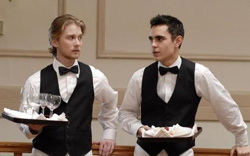
The timeline of the project is also unclear. It’s as though the interviews were cut out and jumbled up in a paper bag before being laid out next to each other. And given that the interview subjects’ numbers are non-sequential and not all accounted for, you get the idea that we’re only getting a small sample of Sara’s whole research project. Whether this sample is representative is anyone’s guess.
Sara does flashback to her relationship with subject No. 20, and these short social scenes provide the only context we’re given for any of the interviews (and are the source of most of the actual dialogue in the movie). Krasinski plays No. 20, the man with whom Sara had recently split after he cheated on her, and their interaction is the most fraught, with Sara clearly struggling to assert any sort of academic distance.
Not incidentally, it’s the one interview that takes place in her apartment and on personal territory. But like most of the men Sara interviews or observes, No. 20 is blunt. “How could you?” she asks. “We were in love,” she insists. “No, we weren’t,” he says flatly, and then goes on to tell the story of his affair with a hippie that reveals a vision of love that is strangely self-absorbed. But even he recognizes his need to be saved. Saved from what? Saved by whom? That’s not entirely clear. At least, not yet.
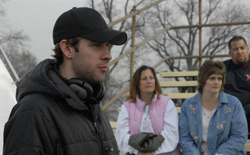
As a novelist and essayist, Wallace did not suffer the impatient gladly in his writing. The “infinite” in his brilliant Infinite Jest feels like a reference to the page count when adrift in the middle of the spine bulk. And so it should come as no surprise that a film adaptation of his work that takes the source material seriously offers little reward for only cursory engagement. But I have a suspicion that with dedication and patience there is some reward to be extracted here. It’s only a suspicion at this point.
Brief Interviews spends much of its time batting around the question of women—what they want, whether they know what they want, why they behave the way they do, how to best have sex with them. But the question this movie really gets at isn’t so much what women want, but what men want. The movie provides more questions than answers on both fronts. But it got me thinking, and so I’ll be off to the bookstore soon to track down the source material.
Talk About It
Discussion starters- Did you relate to any of the interviewees? Why or why not?
- Why do you think Sara decided to take on this study? What were her actual motivations?
- Why do you think Sara insisted to one of her subjects that his wife could save him? What do you think she meant by that?
- What question do you think Ryan wanted Sara to ask him?
- What does Scripture have to say about what we want and need out of life? How does that vision compare and contrast with the ideas in this movie?
The Family Corner
For parents to considerThis film is unrated, but it seems likely it would have garnered an R for mature subject matter and harsh language. Coarse language is used to describe women’s bodies.
Photos © IFC Films
Copyright © 2009 Christianity Today. Click for reprint information.




